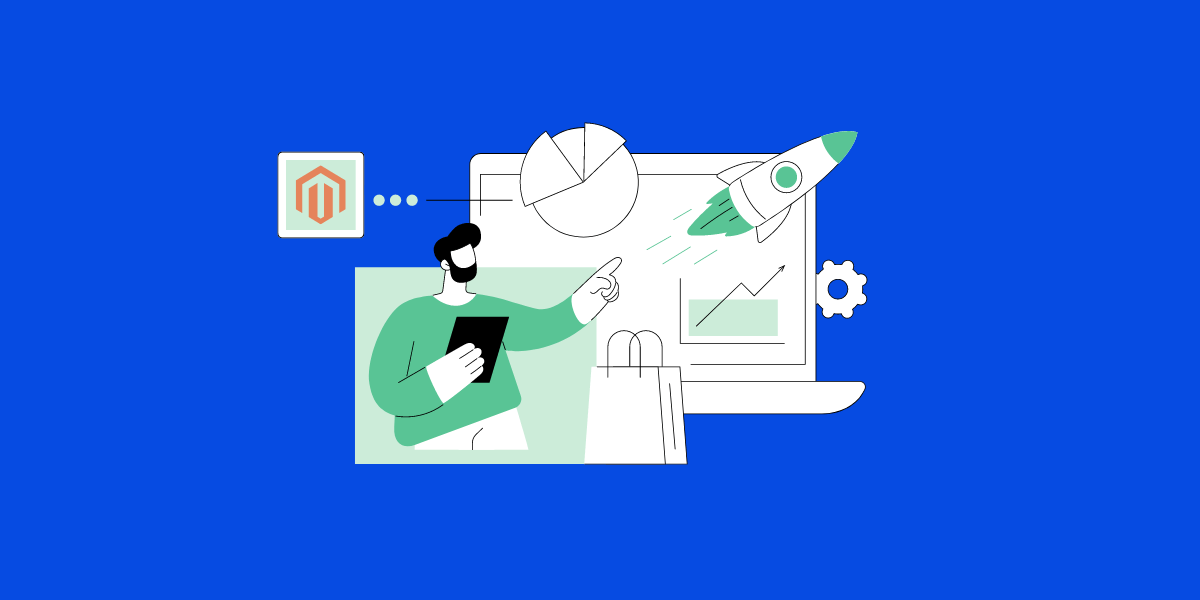Hire remote Magento developers that you can trust
Hire Magento developers from a unique network of 50,000+ pre-vetted offshore talents from Europe and Latin America, looking for a full-time contract. YouTeam developers stand apart for their ability to think like product managers and act like software architects. We also manage everything, so there’s zero overhead for your company.
Hire developers212 best Magento developers for hire on YouTeam in February 2025

Dmitriy
Senior Magento Back-End Developer
Andrew
Certified Magento 2 Developer
Osvaldo Escobar
Senior Software Developer
Alex
Senior PHP Developer | Tech Lead
Vitaliy
Front-End Developer
Volodymyr
Certified Senior Magento Back-End Developer
Alex
Senior Back-End Developer
Viktoria
Full-Stack Developer
Roman
Magento Developer
Dmytro
Full-Stack PHP DeveloperStart hiring to
see all talent
Hire
developers

Best Developer
Full-Stack PHP DeveloperTrusted by Fortune 500 companies and Y Combinator startups
Why hire Magento developers with YouTeam
 48-hour personalized matching
YouTeam handpicks the best-matched candidates.
48-hour personalized matching
YouTeam handpicks the best-matched candidates.
 Zero overhead
Locally-compliant contracts and billing
Zero overhead
Locally-compliant contracts and billing
 Dedicated white-glove support
Dedicated white-glove support






How to hire Magento developers with YouTeam
Share your requirements Set up a quick call with one of our Matching Experts — your dedicated contact at YouTeam.
Undergo Personalized Matching Your Matching Expert curates a candidate list, conducts pre-interviews, and ensures a perfect match for your needs—covering developers' skills, tech stack preferences, interests, and personality.
Meet the right candidates Review a list of candidates screened specifically for your request and pick the best for the interview stage. Average interview-to-hire ratio on YouTeam platforms: 1.75.
Hire and work with confidence YouTeam automates contract signing and invoicing through its secure system. Your dedicated Matching Expert stays with you throughout the collaboration with contractors.

Find developers skilled in related technology
More technologiesRead about Magento on our blog
 The Ultimate Guide to Hiring Magento Developers
The Ultimate Guide to Hiring Magento Developers
Artem Vasin
 A Complete Guide To Hiring An Offshore Front-End Developer
A Complete Guide To Hiring An Offshore Front-End Developer
Svetlana Shevchuk
About Magento
- What is Magento?
- Key use cases for the Magento platform
- Magento tech stack: Key components
- What is the role of a Magento developer?
- Magento developer experience levels
- Tasks and responsibilities of Magento developers
- Skills to look for in a Magento developer
- Types of Magento developers: freelancers, in-house engineers, and outsourced programmers
- How to write the Magento developer job description?
- Hiring Magento developers: Hard skills assessment questions
Magento is an innovative open-source e-commerce platform that has revolutionized the way businesses create and manage online stores since its inception in 2008. Built on PHP, Magento empowers merchants with an extensive array of features designed to enhance their online presence and optimize customer experiences. With its scalable architecture and flexibility, it caters to businesses of all sizes, from startups to large enterprises, enabling them to build robust, customizable e-commerce solutions.
Magento excels in various e-commerce scenarios, showcasing its versatility and adaptability. Here are some prominent use cases:
1. B2C and B2B E-commerce: Whether for direct sales to consumers or facilitating wholesale transactions, Magento supports both B2C and B2B models, making it suitable for a wide range of businesses.
2. Multi-Store Management: With its robust capabilities, Magento allows businesses to manage multiple online stores from a single interface, streamlining operations across different brands and product lines.
3. Customizable Online Stores: The platform’s extensive library of themes and plugins offers developers the ability to create highly tailored shopping experiences that reflect individual brand identities.
4. Marketplace Solutions: Magento is an excellent choice for building marketplace platforms where multiple vendors can sell their products, enhancing product variety and consumer choice.
5. Mobile Commerce: With responsive design features, Magento ensures that online stores are optimized for mobile devices, allowing businesses to capture the growing mobile shopper segment.
The technology stack behind Magento is a powerful blend of components that enhance its functionality. Here are the key elements:
- PHP: As the backbone of Magento, PHP allows developers to create dynamic and feature-rich e-commerce applications.
- MySQL: This robust database management system enables efficient data storage and retrieval, crucial for handling extensive inventories and customer data.
- HTML, CSS, and JavaScript: Essential for crafting engaging and responsive user interfaces, these front-end technologies enhance the overall shopping experience.
- Magento’s Framework: The platform’s modular architecture permits easy addition or modification of functionalities without disrupting the overall system.
- Composer: This dependency management tool simplifies the installation and updating of libraries and packages necessary for Magento projects.
Magento developers play a crucial role in creating, customizing, and maintaining e-commerce websites built on the Magento platform. Their responsibilities encompass designing user-friendly interfaces, developing new features, optimizing site performance, and ensuring the smooth operation of online stores. By collaborating with designers and other stakeholders, Magento developers work to craft engaging shopping experiences, integrate payment gateways, and implement third-party services, all while following best practices for security and scalability.
Magento developers are categorized into three experience levels: junior, mid-level, and senior, based on their skills and years of experience.
- Junior Magento Developers
Experience: 0-2 years.
Skills: Typically, they have a foundational understanding of PHP and basic Magento concepts, alongside knowledge of HTML, CSS, and JavaScript. Familiarity with version control systems like Git is often present.
Role: Junior developers generally assist in simpler tasks under the guidance of more experienced developers, focusing on learning best practices. - Mid-Level Magento Developers
Experience: 3-5 years.
Skills: They possess a solid command of Magento development, PHP, and e-commerce principles, with experience in customizing themes and developing extensions.
Role: Mid-level developers work independently on projects, contributing to feature development and collaborating with team members to meet user needs. - Senior Magento Developers
Experience: 5+ years.
Skills: Senior developers bring extensive expertise in Magento and PHP, with a deep understanding of software design patterns and best practices. They often have experience in team leadership and mentoring.
Role: They handle complex projects, lead development teams, and make architectural decisions, ensuring high code quality while guiding junior and mid-level developers.
Magento developers undertake a variety of tasks and responsibilities, including:
- E-commerce Development: Designing and building online stores using the Magento platform, ensuring adherence to best practices and coding standards.
- Theme and Extension Customization: Modifying existing themes and creating custom extensions to enhance store functionalities and user experience.
- Database Management: Writing queries and managing databases to ensure efficient data handling.
- Performance Optimization: Analyzing and optimizing code to improve performance and debugging issues as they arise.
- Collaboration: Working with designers and front-end developers to ensure seamless integration of user interfaces and functionality.
- Testing: Writing and executing tests to validate application functionality and reliability, ensuring high-quality deliverables.
- Documentation: Creating and maintaining documentation for code, APIs, and project specifications to facilitate team collaboration.
- Version Control: Utilizing version control systems like Git to manage code changes and maintain project history.
A proficient Magento developer is not merely a coder; they are creative problem-solvers capable of adapting to evolving technologies. Here are key skills to seek when hiring a Magento developer:
- Proficiency in PHP: A solid understanding of PHP is essential, as Magento is built on this programming language. Candidates should have experience with object-oriented programming and familiarity with PHP frameworks.
- Magento Framework Knowledge: Candidates should possess hands-on experience with Magento, including its architecture, features, and best practices.
- Database Management: Knowledge of MySQL and database optimization techniques is vital for efficient data handling within Magento.
- Front-End Technologies: Familiarity with front-end technologies like HTML, CSS, and JavaScript is crucial for seamless integration of back-end functionality with user interfaces.
- E-commerce Principles: Understanding e-commerce best practices, including payment processing, inventory management, and customer experience optimization, is essential.
- Version Control: Proficiency in version control systems, especially Git, is important for collaboration and effective code management.
- Testing and Debugging: Knowledge of testing frameworks and debugging tools is crucial for ensuring application reliability and performance.
- Problem-Solving Skills: Strong analytical and problem-solving abilities are essential for troubleshooting issues and developing efficient solutions.
When looking to hire Magento developers, you generally have three main options: freelancers, in-house engineers, and outsourced programmers.
- Freelance Magento Developers
Freelance Magento developers can be found on various platforms, allowing companies to hire them for specific projects or tasks. They are ideal for short-term assignments, such as developing new features or fixing bugs, providing flexibility for businesses. However, it can be challenging to find a developer with the right skills and experience for complex projects. - In-House Magento Engineers
In-house Magento developers are typically employed full-time and are dedicated to the core development of your e-commerce platform. They provide a higher quality of work than freelancers, as they have a vested interest in the success of the product and the company. However, hiring in-house developers involves a greater financial commitment, including salaries, benefits, and additional costs for tools and infrastructure. - Outsourced Magento Developers
Outsourcing Magento development allows you to hire developers through agencies or platforms specializing in tech talent. This option is beneficial for businesses looking to scale quickly or fill specific roles without long-term commitments. Outsourcing can provide access to a wide pool of skilled developers who can seamlessly integrate with your existing team.
Creating a concise and appealing job description is essential for attracting qualified Magento developers. Here are the key components to include:
1. Job Title: Use a clear title, such as “Magento Developer,” to specify the role.
2. Company Overview: Briefly describe your company, including its mission and the technologies you use.
3. Job Responsibilities: List primary duties, such as:
- Developing and maintaining e-commerce websites with Magento.
- Collaborating with front-end developers.
- Writing clean and scalable code.
- Troubleshooting and debugging applications.
4. Required Skills: Specify essential skills, such as:
- Proficiency in PHP and Magento.
- Knowledge of front-end technologies (HTML, CSS, JavaScript).
- Experience with version control (e.g., Git) and databases (e.g., MySQL).
5. Education and Experience: Indicate the desired education and experience level, such as:
- Bachelor’s degree in Computer Science or related field.
- 2-5 years of e-commerce development experience.
6. Salary and Benefits: Provide a salary range if possible and outline any benefits, such as health insurance, retirement plans, professional development opportunities, or flexible working hours.
7. Application Process: Clearly explain how to apply and what documents (resume, portfolio) to submit.
Here are six advanced questions designed to assess a candidate’s depth of knowledge and practical experience in Magento development:
1. Can you explain the difference between Magento 1 and Magento 2? What are the key improvements in Magento 2?
This question assesses the candidate’s understanding of Magento’s evolution. A strong candidate should highlight enhancements in performance, security, and usability, such as the introduction of a more modular architecture, better database handling, and improved front-end development capabilities through the use of technologies like Knockout.js.
2. How would you optimize the performance of a Magento store? Can you discuss specific caching techniques and their implementations?
Candidates should demonstrate knowledge of various caching mechanisms, including full-page caching, block caching, and Redis or Varnish caching strategies. Their answers should reflect an understanding of how these techniques can reduce load times and improve overall site performance.
3. Describe your experience with creating custom Magento extensions. What challenges did you face, and how did you overcome them?
This question allows candidates to showcase their practical experience in Magento development. They should discuss specific projects, the unique requirements of the extensions they built, and any hurdles encountered, such as compatibility issues or performance optimizations.
4. What are Magento’s best practices for handling database migrations? Can you describe a migration you’ve performed?
This question probes the candidate’s understanding of database management within Magento. A well-rounded answer should include strategies for ensuring data integrity during migrations, using tools like Data Migration Tool, and steps taken to test and validate the migration process.
5. How do you ensure security best practices in a Magento installation? What measures do you take to prevent common vulnerabilities?
Candidates should demonstrate familiarity with security practices such as regularly updating Magento to the latest version, using secure payment gateways, implementing HTTPS, and configuring proper user permissions. They may also discuss the importance of using tools like Magento Security Scan to identify vulnerabilities.
6. Can you explain how you would implement a custom payment gateway in Magento? What steps are involved?
This question assesses the candidate’s understanding of Magento’s payment architecture. They should outline the process of creating a new payment method, including creating a module, defining payment method settings, and ensuring compliance with Magento’s standards.
FAQ about Hiring Magento developer
Why choose YouTeam to hire Magento developers?
YouTeam offers access to a highly qualified pool of Magento developers, helping you scale your team quickly. Each developer is thoroughly vetted, ensuring their skills, experience, and reliability. With partnerships across 500+ development agencies and over 50,000 developers, you can receive qualified candidates within 48 hours, making it a fast and reliable solution for your hiring needs.
How does YouTeam vet Magento developers?
YouTeam follows a multi-stage vetting process. First, developers are sourced from trusted development agencies, ensuring they meet the necessary skill and experience requirements. Pre-screened candidates are then forwarded to clients for further interviews, allowing them to select the best fit based on specific project needs.
How much does it cost to hire the best Magento developers through YouTeam?
The cost of hiring Magento developers on YouTeam varies based on factors like expertise, location, and skills. On average, a Magento developer through YouTeam charges around $42 per hour, though rates can fluctuate depending on specific project requirements.
How quickly can you hire with YouTeam?
With YouTeam, you can hire developers faster than traditional methods. Here’s why:
1. Shortlist in 48 hours: Powered by our AI Matchmaker and human experts, we deliver a tailored shortlist of vetted candidates within just 48 hours.
2. Larger talent pool: As a marketplace, YouTeam offers access to a broader range of developers from hundreds of partner agencies, giving you more options than typical outsourcing agencies.
3. Seamless process: From the moment you request a call, our Matching Experts handle the rest, ensuring you quickly receive top-quality candidates who match your precise requirements.
YouTeam helps its clients build development teams within just a few weeks, not months.
What is the no-risk trial period for YouTeam developers?
1-Month Trial: You can terminate the engagement at any time during the first month.
Free Replacements: If you’d like to replace a contractor, we’ll do it within two weeks, free of charge.
You can learn more by reading our Money-Back Guarantee.
How is YouTeam different from freelance portals for hiring Magento developers?
Unlike freelance platforms, YouTeam connects you with developers from trusted software development agencies, not freelancers. This ensures that developers have the necessary technical and soft skills, along with relevant experience. If a developer needs to be replaced unexpectedly, YouTeam can quickly provide a substitute of equal skill to avoid project delays.
What is the average salary for Magento developers?
The average salary for Magento developers varies based on factors such as geographic location, experience level, and company size.
In the United States, a junior Magento developer typically earns between $60,000 and $80,000 per year. Mid-level developers with 3-5 years of experience can expect to make around $80,000 to $110,000 annually, while senior Magento developers with extensive expertise may command salaries ranging from $110,000 to $150,000 or more, particularly in tech-heavy regions like California and New York.
In Eastern Europe, salaries are generally lower due to cost-of-living differences. Junior developers earn between $25,000 and $40,000 per year, while mid-level developers make around $40,000 to $65,000. Senior developers in this region typically earn between $65,000 and $90,000 annually.
In Latin America, salaries are comparable to those in Eastern Europe, with junior developers earning between $20,000 and $35,000, and mid-level developers earning around $35,000 to $55,000. Senior Magento developers can earn between $55,000 and $75,000 annually.
Reviews
“It's just much more convenient to find a small team. I talk to one person, get 5 hand-picked CVs, interview candidates, hire the best ones – and I’m done!”
“Every time YouTeam sends me a list of potential developers, I am confident that I can interview pretty much anybody and they will be a good candidate.”
“The decision to use YouTeam was made by comparing them directly to the other candidates. As soon as I started talking to them, YouTeam adopted a hands-on approach. Time-wise, YouTeam also performed well.”
“We will definitely continue with them in the future. I’m so happy with their work that I’ve recommended them to my other company as well. There were no issues, it was really good. I gave a very loose brief, and the developer who worked for me had enough initiative to tighten it up by asking relevant questions. There was no messing around—it was done really well, with good, clean code.”
“YouTeam was very quick and responsive. I was presented with great candidates in just days, which was fantastic for me because we were looking to move fast. They had experience working on similar projects to exactly what we needed.”
“We wanted to boost our capacity for a period of six to twelve months. I decided to get a shot with YouTeam is that in any other place I can't say that I'm looking for a team of 5 developers with the possibility to scale. Now I returned to them again - this time for the confidence. If somebody is on the YouTube platform, you know that they've met a certain threshold of customer satisfaction, they've got a history of successful work elsewhere.”










